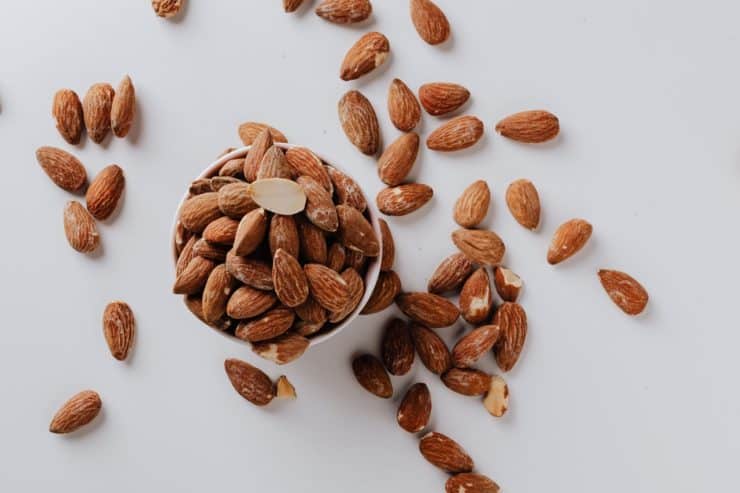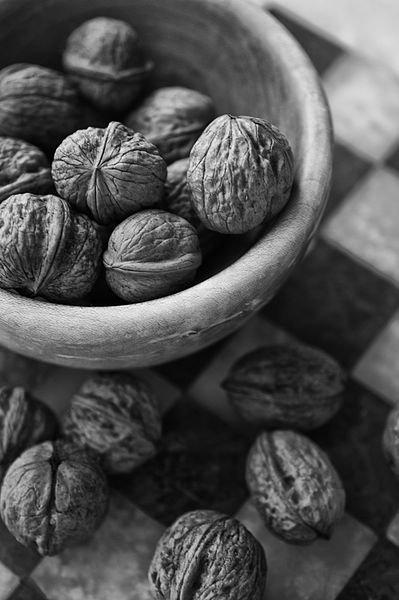Do the hidden health dangers of nuts outweigh their benefits? You might be surprised!
By Diane Small
We all know that their thin skins make berries, peaches and apples amongst the most contaminated fruits when it comes to pesticides. So when I saw bags of organic nuts in the shops, I thought it was a bit of a joke: I mean, have you ever tried to hand crack a walnut or Brazil nut? It’s well nigh impossible without major tools. Their skins are so tough, they’re not even called skins – they’re shells! So it seems like it would be really, really difficult for pesticides to penetrate those, right?
Sort of.
Sure, nuts contain healthy, unsaturated fats which can help lower the risk of heart disease. All nuts are also a good source of vitamin E, an important antioxidant, and like all plant foods, they’re high in fibre and phyto-chemicals–both of which help protect against cancer and other serious diseases.
Nuts are also rich in magnesium, which helps maintain bone structure, and chromium, which helps to ensure proper insulin function. They’re also packed with zinc for cellular growth and wound healing, and manganese, which protects against free radicals.
But there are indeed some hidden health dangers of nuts you may not know about. Plus, all nuts are not the same, in terms of how they can boost – or harm – your health.
Cooked Or Raw? It Makes A Difference!
First up, we all know that salted nuts are too high in sodium to be considered healthy. We also know that roasting usually destroys nut nutrients, so we choose to eat them raw, right? But nuts are not actually raw unless you purchase them from the grower, as USDA laws require them to be pasteurised before they are sold in the supermarket. So pasteurising could be considered one of the other hidden health dangers of nuts.
Analysis of raw and processed pistachios, almonds, peanuts and sesame seed paste were published in the Journal of Agricultural and Food Chemistry back in 2008. Results revealed an increase of lipid oxidation indicators in the roasted and heat treated nuts compared to the raw ones. Also, results from the heat treated nuts showed an increase of trans fats, which the American Heart Association recommends to be eliminated from your diet due to their adverse health effects.
That being said, eating roasted or boiled peanuts may still be a better choice, as their antioxidant activities are preserved and, in some cases, even enhanced after processing. In September 2010 “Plant Foods For Human Nutrition” displayed results from a study where scientists from the University of Georgia found that antioxidant activity increases the most by oil roasting peanuts compared to dry roasting them. Raw peanuts had the lowest amount of antioxidants.
Some other nuts, such as cashews, are also better roasted. In May 20211, the Journal of Agricultural and Food Chemistry published a study by the Memorial University of Newfoundland, Canada, on the antioxidant activity of roasting cashews. The results showed an increase in the absorbency and scavenging capabilities of the antioxidants in cashews, leading to an increase in the power of reducing free radicals in these nuts. Also, there was a higher yield in the phenolic compounds and flavonoids, which are both powerful antioxidants. These effects were seen in cashews roasted at 130 degrees Celsius for 33 minutes or less.
So, to sum up: roasted peanuts and cashews could be better for your health. But most other roasted nuts are worse.
The Hidden Health Dangers Of Nuts
While nuts may not be sprayed with pesticides on the tree when they are growing, guess what? They are sprayed once picked and cracked. And all nuts easily absorb pesticides because of their high oil content, so you really should buy organic, or shell the nuts yourself.
There are also often loads of pesticides and fungicides sprayed on nuts after they’re shelled. Cashews can be sprayed with endosulfan, a chemical which is very harmful to both humans and animals. Pistachios may be treated with phosmat, which, according to a study done by Cornell University, causes liver tumours and carcinomas and is extremely toxic to honey bees. Monsanto’s notorious, cancer-causing pesticide glyphosate may also be sprayed on pistachios to help the shell open, and DDT was found in two samples of nut butter at the last national testing done.
Walnuts normally have a lot of pest issues and so are usually super-saturated with pesticides and more chemicals than any other nut. Macadamia nuts are treated with atrazine, which has been shown to harm aquatic organisms, and there is some evidence that it has a negative impact on human reproduction.
Most nuts also contain traces of inorganic bromide, which is the result of the use of methyl bromide, which is applied to nuts to kill rats, mice and other pests while the nuts are being stored.
Methyl bromide is an ozone-depleting chemical whose use has already been stopped in some countries, as it is considered to be a dangerous chemical to use.
Not Quite A Nut, But…
Now let’s talk specifically about the hidden health dangers of nuts that aren’t actually nuts: peanuts. They’re really a legume, not a nut, and grown in the ground where they have ample time and space to absorb loads of the pesticides they’re sprayed with.
Allergies to peanuts have inexplicably increased dramatically over the past few decades. Some claim that it may be because there are more of them in our diets, but that discounts the fact that in some cultures where peanut sauce is common (Indonesia, Thailand) nut allergies are far less.
Others argue that peanut oil used in some vaccinations may be the culprit, or perhaps it’s that we’re not as exposed to healthy, natural bacteria in the soil as we used to be. In any case, nut allergies have only skyrocketed over the past 20 years or so.
Adding to the nut misery is the fact that peanuts – and all nuts, in fact – which are grown in humid areas can potentially grow a mould that produces aflatoxin, a potent human liver carcinogen.
Liver cancer rates are often higher in tropical countries that consume a lot of peanuts and peanut sauces, due to the lack of regulation to kill off the mould. But when the mould is killed off, it’s usually with pesticide, so how can we win?
The Good News About Nuts
Basically, unless you are willing to grow, crack and shell your own nuts, organic nuts are the only way to go. In developed nations, alternative fumigation treatments such as double layered bags and vacuum packing are used, as are a maximum of six artificial anti-pest or fungus treatments. It may seem like a lot for organic products, but by contrast, the conventional nuts sampled by the PRC were tested for 51 chemicals, so organic nuts are still far healthier.
It’s true that organic nuts are expensive, though. An alternative is to buy Fair Trade nuts, as smaller-scale suppliers tend to use fewer chemical fertilisers because of the prohibitive cost, but fumigants may well be used when the nuts are in storage.
It’s a good thing to keep buying certain nuts, especially Brazils, if you want to keep the rain forest intact: Brazil nuts are collected from the last remaining tracts of the virgin Amazonian rainforest, which is rapidly shrinking. Brazil nuts can’t be grown on plantations as various wild elements are essential for their success, so wild is the only way – increased demand for Brazil nuts means more protection for the forests!
Additionally, hazelnuts are a great example of sustainable agriculture. Not only do they require little water and minimal upkeep, but they can thrive in harsh soils where other plants would fail. They’re drought-resistant, can survive harsh weather conditions, have a high yield per plant, and help prevent soil erosion. Because they’re so hardy, few pesticides need to be sprayed on them. They also have massive root system, and they remove a huge amount of carbon from the atmosphere.
So, Are Nuts Really Good For Us?
So, in a nutshell? Nuts do indeed provide a great source of vegan protein, fibre, Omega 6 and 3 fats, vitamin E and minerals. But the hidden health dangers of nuts lies in the fact that they’re actually often heavily sprayed with pesticides.
Nuts are packed with nutritional benefits, there’s no doubt about it. But to stay truly healthy, it is extremely important to always purchase organic nuts and seeds.
All images: Wikicommons
- 5 Ethical European Vacation Ideas For 2025 - July 17, 2025
- 10 Easy Tips For A Plastic Free Beauty Routine - July 9, 2025
- Save the Bunny! China’s Cosmetic Cruelty - July 3, 2025


Thank you xx
God bless you xx
Pingback: Why Organic Nuts (and Seeds) – Pure Living CR
Women I assume expect facts so could author please respect this before posting. Only a minority of nutrients are lost from roasting, even less if not done at high temperatures. Furthermore while skin affects contamination, berries are not most contaminated because their skins thinner, berries are more contaminated because they’re sprayed more than other foodstuffs.
Nuts do provide a good source of vegan protein why vegan ? why this expression i don t get it. if you are vegetarian it means you re eating only things from plants trees bushes. if you re eating egg poultry see food you re not vegetarian it s all animal protein. vegan is a useless expression
Vegan means a food doesn’t contain dairy, eggs or meat, and when we say ‘vegan protein’ we just mean a source of protein that is 100% plant based. Hope that helps!
I agree, I had the same reaction. The way it was worded gave the impression that nuts are a special food just for vegans. Anyone can eat nuts, not just vegans, and they are valuable not just for protein but for their healthy fats, which in my opinion, is more important. Everyone already knows that nuts are not an animal product.
What are the six artificial anti-pest or fungus treatments used with organic nuts?